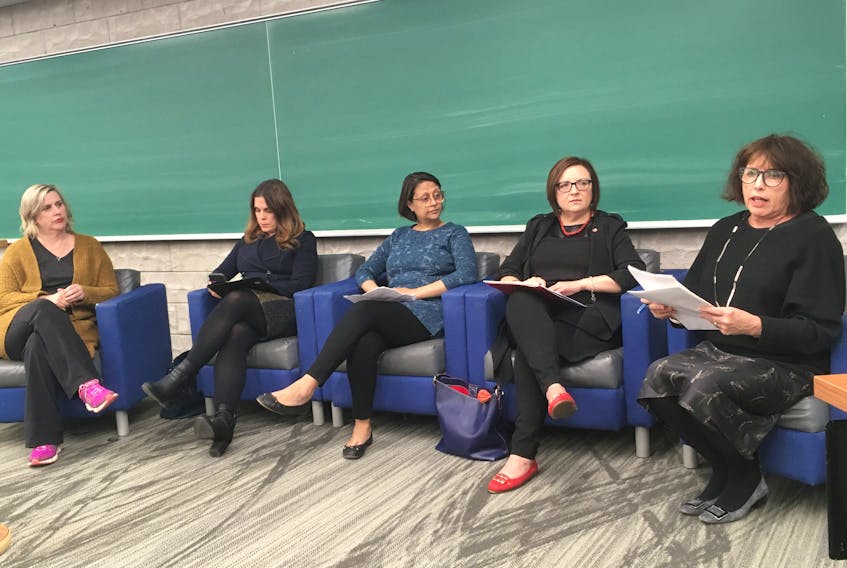At a panel discussion this week at Memorial University about bullying and harassment in Newfoundland and Labrador politics, panelists called on politicians — and the public — to push for systemic change, make space for all voices and discourage inappropriate behaviour.
Among the audience were NDP Leader Gerry Rogers, Progressive Conservative Leader Ches Crosbie and Liberal MHAs, including Speaker Perry Trimper.
The event, in a classroom inside the university’s Arts and Administration Building, began with frank talk on the existence of bullying and harassment.
It spun out into open discussion, including suggestions about how to improve the political system.
Student Lauren Hayes was a member of the audience and kick-started a question and answer portion of the night by asking what participants in the political scene — not necessarily just MHAs — could do when they encounter bullying or harassment within their party of choice and want to address it, but don’t want to be targeted or isolated.
“The reason somebody would offer themselves for election is because they want to make change. I would also think that anyone who wants to be a member of a political party is because you want to see change … so we have to be challenging one another, we have to be teaching one another,” said Rogers, turning in her seat in the audience to speak to Hayes in response.
Rogers suggested asking yourself if your party’s leadership is where it should be on the issue of bullying and harassment.
“And how democratic is the party in and of itself?” she said, suggesting if people don’t feel OK to speak without repercussions, they should consider a change.
St. John’s Status of Women Council executive director Jenny Wright, a member of the guest panel, said it’s a reality that individuals can’t always take on the system. They shouldn’t be required to, she said.
She recommended, apart from more staff in wide-reaching organizations like the Women’s Policy Office, people participate with political parties that demonstrate they are conscious of harassment and gender issues in politics, willing to set written anti-harassment policies and revisit policies on a regular basis, to assure they are up to snuff.
“Refuse to join something that doesn’t have one … but insist that it’s brought out and it’s talked about,” she said.
Unifor’s Atlantic regional director Lana Payne agreed, pairing Rogers’ mention of the democratic nature of political parties, pairing it with Wright’s comments, and recommending another option.
“If the party doesn’t have a process to deal with harassment complaints — and I would suggest a formalized process — then this is something you and a group of friends in the party could work on and suggest and get passed at a convention,” she said, adding policies should be paired with people you can go to, with the means to put written policy into action.
Carey Majid from the Newfoundland and Labrador Human Rights Commission recommended leveraging the broad, public conversation on harassment right now to help address whatever you personally might face.
“We have a lot of calls from people. They phone with similar situations, not in politics, but … they’ve got nowhere to turn,” Majid said, who previously noted that calls to the commission have doubled since complaints suggesting bullying and harassment by members of the House of Assembly went public, even though not all calls are to file harassment complaints.
Majid recommended leaders not just have robust policies, but talk about the practical ways to respond to discomfort and inappropriate behaviour.
“It’s down to, how do you have this conversation with somebody? What do you even say? How do I go up to my boss/owner on this and say, ‘I have a problem with this’? A lot of people don’t know how to do that,” she said.
For the political sphere, executive director of Equal Voice Nancy Peckford referenced federal Bill C-65 as a “not perfect” but solid national standard and template for the political arena.
“I think we can also say, at every (party) convention, we expect these conversations will happen,” Peckford said, referring to such an anti-harassment session at the federal Liberal convention, while adding federal organizations are further ahead than provincial ones on the issue.
Apart from the panel, the week offered the results of a Corporate Research Associates poll looking at the handling of bullying and harassment as an issue for the House of Assembly.
The results — gathered from 400 adults in Newfoundland and Labrador, between May 3 and May 17 — suggest four of 10 residents are “completely or mostly confident” the issues of bullying and harassment will be addressed appropriately, while just over half (55 per cent) said they were not very or not at all confident the issues of bullying and harassment will be addressed appropriately.
The idea of “addressed appropriately” wasn’t specified, but the results were said to be accurate to within plus or minus 4.9 percentage points, 95 out of 100 times.
A toxic political climate?
At the same time Corporate Research Associates was polling on bullying and harassment concerns, The Telegram was tackling its own outreach, specifically with a collection of elected officials and former provincial candidates.
People were asked for their two cents’ worth on recent events at the House of Assembly — with two provincial ministers removed from their posts and a third MHA, a former cabinet minister, speaking generally to inappropriate behaviour.
They were also asked what they think it could all mean for political recruitment, if anything, and if they would consider running again.
“It is definitely a deterrent,” said Johanna Ryan Guy, who ran as an Independent against Liberal MHA Neil King in the district of Bonavista in 2015.
“I personally wouldn’t touch the current version of our political arena with a 10-foot pole,” she said, offering a succinct comment, while others shared similar thoughts.
In yet other cases, current events were encouragement to try again for a seat in the legislature.
“The real risk is if you don’t put the right things in place, you won’t attract (talent) and you won’t keep it,” said NDP candidate Mona Rossiter, who lost the seat for Ferryland in 2015.
“The rough and tumble nature of politics certainly wouldn’t dissuade me from seeking office,” said Rhonda Churchill-Herder, who ran for the Progressive Conservatives in the district of Mount Scio in 2015.
“Having said that, the recent reports, if nothing else, speak to a certain level of disrespect and what I consider unprofessional behaviour that would not stand in many organizations, whether private sector, public sector or volunteer, certainly not from my experience,” she said.
“One can be assertive and advocate for a position without having to resort to strong-arm tactics, poor conduct and disrespect.”
Jeff Marshall, a candidate for the Liberals in 2015, said he supports addressing the issue of harassment and bullying head on, even if it has been a long-term reality.
He cautioned against the traditional turn toward “personalities and partisan politics” in public debate in Newfoundland and Labrador, and suggested it would be a good time to also consider ways to encourage healthy debate in the public, as well as in question period.
RELATED STORIES:
Private complaints, public response a challenge in N.L. harassment complaints
N.L. municipalities well-versed in harassment, bullying
Political realities and rules of N.L. legislature must factor into harassment debate









